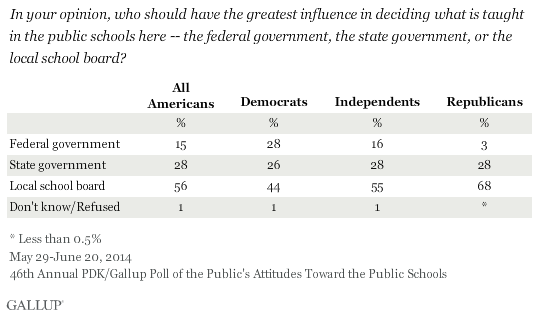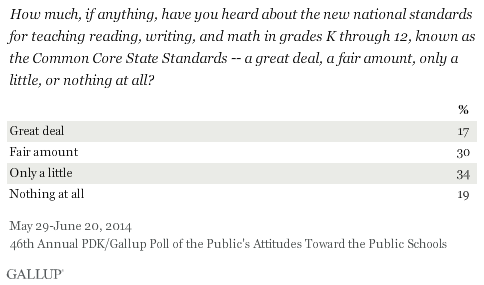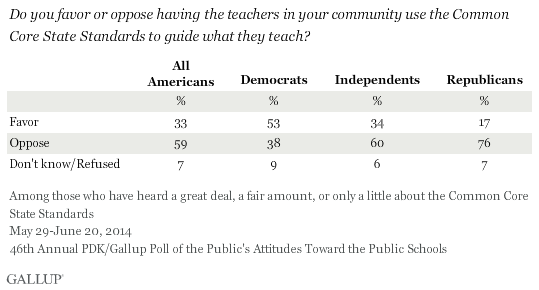Americans Wary of Federal Influence on Public Schools
Prefer local school boards over federal government, 56% to 15%
When asked to reflect on who should have the greatest influence on what is taught in the public schools, Americans prefer local school boards over the federal government by a wide margin, 56% to 15%. Twenty-eight percent believe state government should have the greatest say on curriculum.

While about nine times as many Democrats as Republicans say the federal government should have the greatest influence, the local school board is still the most popular choice among Democrats.
These findings are from the 46th Annual PDK/Gallup Poll of the Public's Attitudes Toward the Public Schools. Results are based on a Gallup Panel telephone study of 1,001 adults, aged 18 and older, conducted from May 29-June 20, 2014.
Majority of Americans Oppose Common Core to Guide Teaching
Common Core is one of the dominant topics in American public education this decade. About eight in 10 Americans say they have heard at least a little about the Common Core State Standards. Of those, the majority oppose using the standards in their community to guide teaching. Those who report they know "a great deal" about the Common Core are somewhat less likely to favor them (24%) than those who only know a little (39%).

Majority opposition to the use of the Common Core State Standards to guide instruction persists across age, income, and education levels, but opinion diverges by political affiliation. Republicans who have heard of Common Core are twice as likely as Democrats to oppose use of the standards to guide teaching.

Results from the Gallup Daily tracking survey earlier this year show that 52% of public school parents who had heard at least a little about the Common Core Standards were somewhat or very positive about them. The PDK/Gallup poll item is somewhat more specific, but results show that only about one in three (32%) public school parents favor having teachers in their community use the Common Core Standards to guide what they teach.
Common Core Limits Teachers, Opponents Say
Respondents who oppose having the teachers in their community use the Common Core were given four reasons they might oppose them. About two-thirds (65%) say a very important reason is that it will limit the flexibility teachers have to teach what they think is best.
Though the Common Core State Standards were developed by the National Governors Association, it is possible that Americans associate the initiative with the federal government because of support from the Department of Education and President Barack Obama. Despite declining trust in federal agencies and Americans Wary of Federal Influence on Public Schools:

